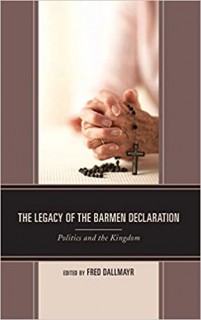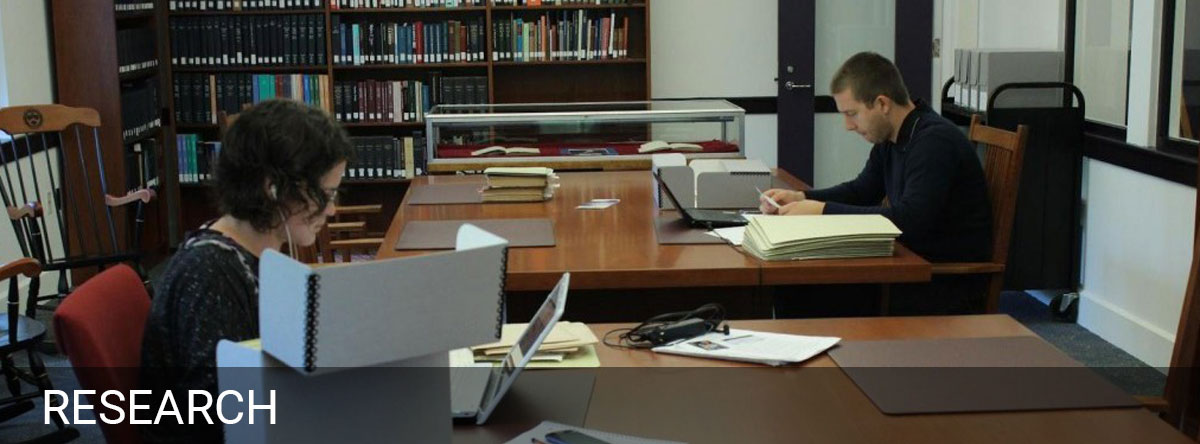 Fred Dallmayr, ed. The Legacy of the Barmen Declaration: Politics and the Kingdom (Lanham, MD: Lexington Books, 2019), 140 pp. $85.00 (hardback).
Fred Dallmayr, ed. The Legacy of the Barmen Declaration: Politics and the Kingdom (Lanham, MD: Lexington Books, 2019), 140 pp. $85.00 (hardback).
Reviewed by Myles Werntz (October 01, 2020)
Despite all the historical excavation which has occurred in the last thirty years, the Barmen Declaration remains shrouded in a kind of mystique. For in the shadow of the gathering Nazi powers, theologians of all people gathered together to speak directly into political life in a distinctly theological way. In this crisp volume, we find a focused, careful account of Barmen in its historical context and a circumspect parsing of what the Barmen Declaration can and cannot promise us today.
The volume opens by laying out a detailed account of the 1934 Confessional Synod of the German Evangelical Church. Central to the Synod is that it was a gathering of various confessional churches—Lutheran, Reformed, and United Churches—which strove to articulate “a common word” and a “common message” (15). Far from using the Nazi crisis to establish a new “super-church” (as was frequently feared with the contemporaneously-emerging World Council of Churches), the Synod made clear that the only thing which can defeat false doctrine is unity “from the Word of God in faith through the Holy Spirit” (15). Without this unity, not only will the declaration not be a word of the Gospel, but the churches will not be renewed. For if the churches respond to corrupted politics by becoming something other than what they are—the bodies of Christ—then they will not only have failed in their vocation but become simply another kind of voting bloc. The errors which Barmen named are well-known—that the church has some source of revelation other than Christ, that doctrine cannot follow political power, and that the Church cannot vest ruling powers with some special privilege, among others. The second chapter reproduces the Barmen Declaration as printed in the Presbyterian Book of Order. Not only does this approach succinctly summarize the anathemas, but by including the declarations of the Synod, one is able to see more clearly that the authors did not simply draft a public letter, but offered up an ecclesiastical document which stakes out what kind of response Christians had to offer here: one of theology and not of statecraft.
The volume raises some notes of disagreement concerning what kind of document the Barmen Declaration is. According to Eberhard Busch, the Barmen Declaration is quite clearly a confession which arises from the various churches’ common confession of Christ as Lord of the one, holy, catholic, and apostolic church (33). These churches’ confession of Christ generates a “fellowship of confessors” in diversified ecclesial form. In Wolf Krötke’s view, however, the statement did not rise to the level of a confession (41), insofar as the Lutheran and Reformed churches recognized enough divergences from their respective traditions that they were uncomfortable viewing Barmen on the same level as Dordt or Augsburg. For all of its force, it was not used in the ordination of ministers, though they agreed in principle on the substance of the statement.
Derek Alan Woodard-Lehman’s essay “Democratic Faith” sets aside the question of whether the Declaration can be named as a confession ecumenically and focuses instead on its status within a Reformed context. Barmen, if it is to rise to the level of the status confessionis, must first be adopted by, spoken by, and presumed by the prior work of churches; the fact that it was written by Karl Barth along with Lutheran and United Church theologians is insufficient for it to have ecclesial weight. The confession must first do work within the churches before it can then, by analogy, do work within a democratic society. If Barmen’s authority rests only with its historic significance and does not take root within the laity, then its application for the demos remains limited. Wolfgang Huber, in his essay on resistance and confession, presents the theological basis of human rights and political freedom which emerge analogously from a confession of faith such as Barmen. Huber argues that although propelled in very different directions because of their respectively Reformed and Lutheran confessions, Barth and Dietrich Bonhoeffer likewise present us with compelling visions of the interwoven nature between the spiritual and the political. Likewise, Fred Dallymyer contends, in his closing meditation on Martin Buber and Barmen, that Barmen sets the table for a more humane politic by reflecting on the petition in the Lord’s Prayer for “thy kingdom come.” Indeed, Bonhoeffer’s own meditation on this phrase of the Lord’s Prayer constitutes the final chapter of the book. The inclusion of this text alongside more focused discussions of Barmen is a strange editorial choice. Though it fits thematically with the theopolitical concerns of the volume, Bonhoeffer’s sermon on this precedes Barmen by almost two years.
The book is framed as a discussion of political theology, albeit a different kind than that which would reduce theological language to its political praxis. By tying together political action to the conditions of confession, two things emerge in this volume. First, the distinction-in-union of confession with political life emerges clearly, without confusion or separation. The refusal to simply do anything or everything can be taken as a vice, but theologically, this unites creation and redemption such that the confession of the church is tethered to the renewal of creation without deflating one to the other. Second, Barmen emerges as an extraordinary work, but one which is ultimately an ecumenical work, and not the work of singular geniuses. Barmen emerges as a confession of churches while remaining the property of none of them unless it can be the shared confession of them all. In Bonhoeffer’s own case, this dimension is frequently minimized: that fraternal church cooperation and ecumenical labor undergirded so much of what became the Confessing Church and is much of the reason the underground theological education he devoted himself to was able to last as long as it did.
I have my own suspicions as to why Barmen remains such a powerful marker in the Christian imagination, suspicions largely stemming from misplaced trust in open statements and an overestimation of the church’s social witness. The perennial story which Christians in America at least tell ourselves is that religious resistance is the birthright legacy that must be reclaimed. In some ways, this is true: in every generation, there is a small contingency—a remnant, as it were—which stands up to the political powers that have colonized Christianity for its own ends, some of which emerge more baldly as anti-Christs in the process. But their numbers are not great, their witness is often unseen, and most of all, there remains confusion as to what counts as a faithful remnant. Divisions among Christians on moral and political questions abound, such that one church’s martyr is another church’s heretic.
Within these multiple acknowledgments emerges another truth surrounding Barmen: for all of its theological acumen and ecumenical force, the Confessing Church, capable of authoring such a document, ultimately fell apart. The Confessing Church did not survive but remained always a fledgling organization. As I read this volume explicating Barmen, this lesson stands up most of all: Barmen is inspiring, but it is also a slow work, enabled by decades of faithful training and ministry before the time of crisis. Apart from that, Barmen would have remained simply a whisper floating on the Rhine.
Myles Werntz, Director of Baptist Studies and Associate Professor of Theology, Abilene Christian University
The views expressed here are strictly those of the author; they do not necessarily represent the views of the Center for Barth Studies or Princeton Theological Seminary.


